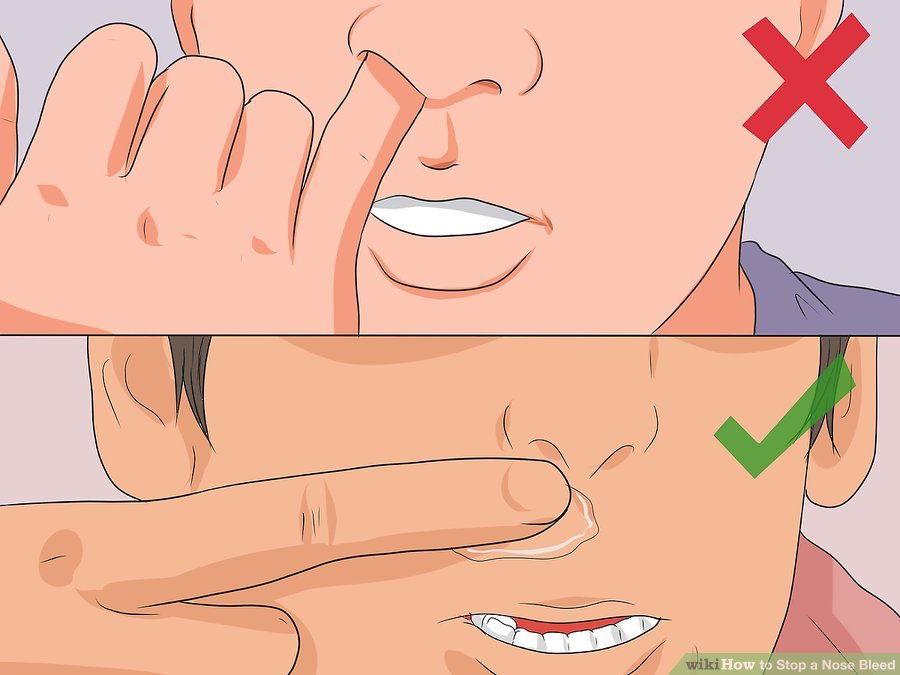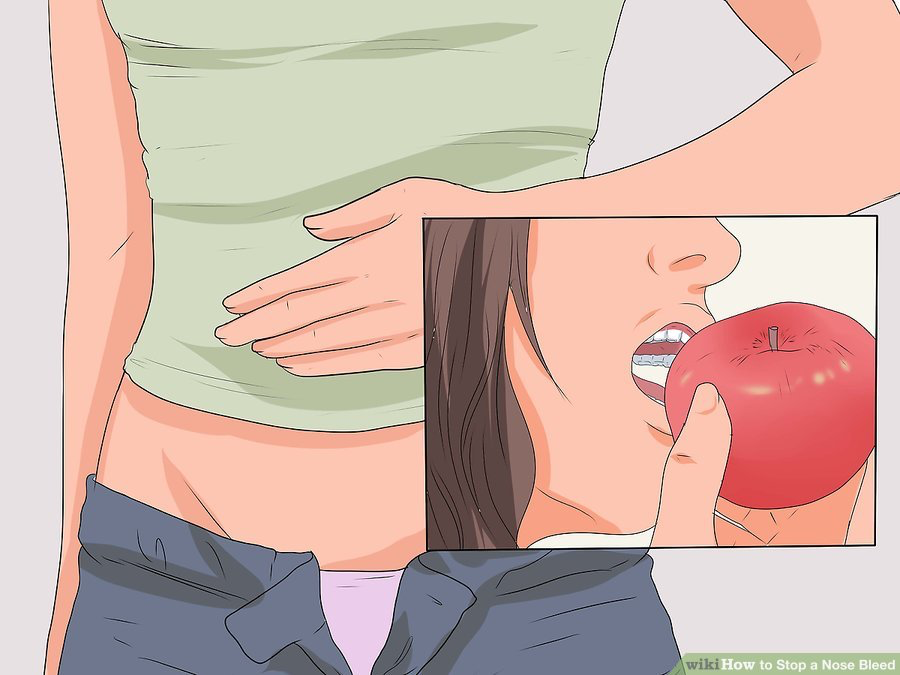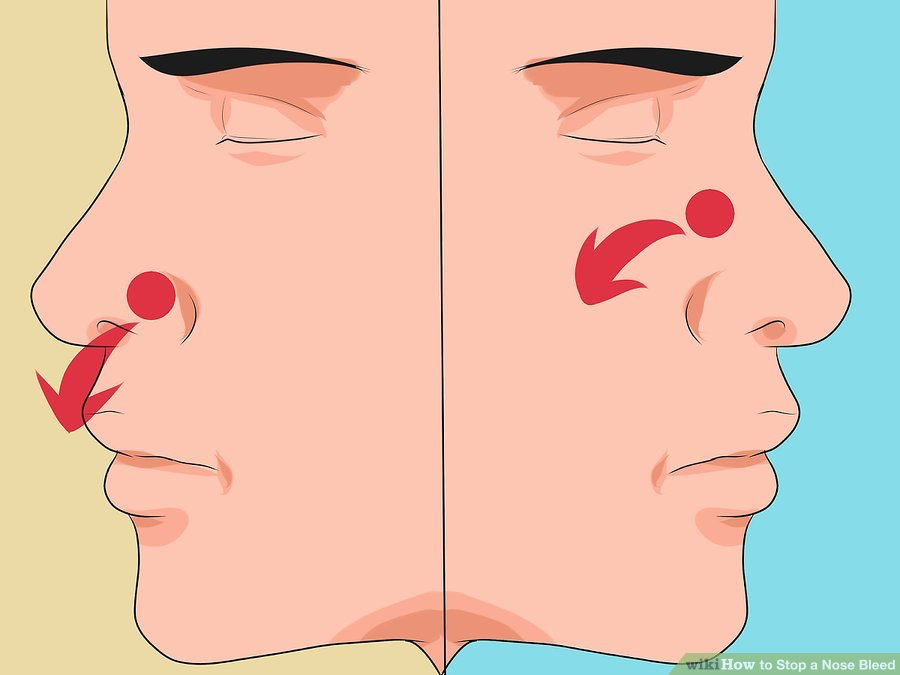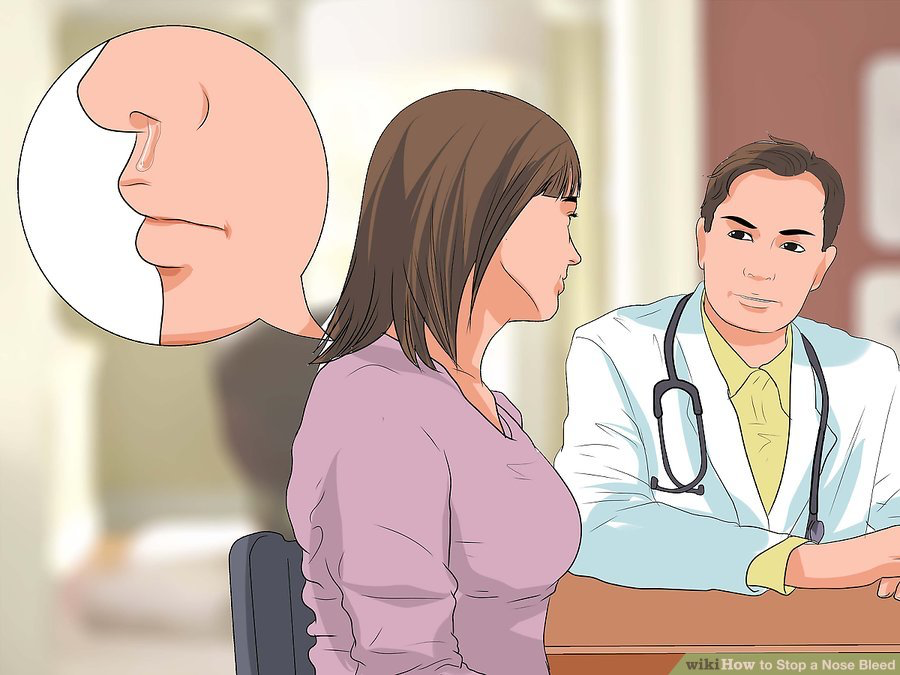Back First Aid Explained
How to Stop a Nose Bleed
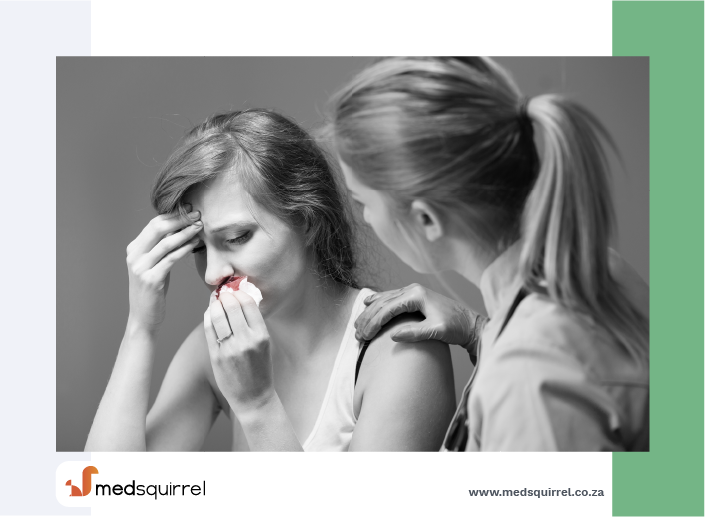
We have selected the following expert medical opinion based on its clarity, reliability and accuracy. Credits: Sourced from the website wikiHow. Please refer to your own medical practitioner for a final perspective, assessment or evaluation.
Overview
Nose bleeds, also known as epistaxis, are a common complaint which can occur spontaneously. Nose bleeds occur when the inner lining of one's nose is hurt or dry. The resulting damage to small blood vessels in the nose induce bleeding. Almost all nose bleeds originate from blood vessels in the front part of the nasal septum, which is the inside middle tissue separating both nostrils. Nose bleeds occur more frequently in patients with nasal allergies, sinusitis, hypertension, or bleeding disorders. If you understand the causes of nose bleeds and how to handle them, you can better manage your own nose bleeds.
1: Performing First-Aid During a Nose Bleed
1. Position your body
If you do not have a serious issue that led to your nose bleed, you can perform some first aid at home during a nose bleed to help stop it. To begin, sit down, since it is more comfortable than standing. Tilt head forward so that the blood drains through the nostrils.
- A towel can be held under your nose to collect the blood.
- Do not lie down as this can cause blood to pass down the throat.
2. Compress the nose
- If bleeding continues, reapply pressure for another 10 minutes.
- While you do this, breathe through the mouth.
3. Cool yourself down
Lowering your body temperature can help reduce the blood flow to your nose. To do this, place ice cubes in your mouth. This helps achieve a lower temperature sooner than cooling the external part of the nose. It also will help you retain the lower temperature for longer.
- This is more effective than placing a cold compress over the nose. Cold compresses placed over the nose are not very effective according to a recent clinical study.
- You can also suck on a popsicle to achieve the same result.
4. Use oxymetazoline nasal sprays
- If bleeding has stopped, do not remove the cotton or gauze for about an hour, because bleeding can reoccur.
- Frequent use of this drug, which is more than 3-4 days at a time, can cause addiction and nasal congestion.
- These sprays are used only if bleeding does not stop on pinching the nose after the first 10 minutes.
5. Wash your nose and rest
After bleeding has stopped, you can clean the area around your nose with warm water. After you have cleaned your face, you should rest for a while. This is to help to prevent further bleeding.
- You can lie down while resting.

2: Preventing Future Nose Bleeds
1. Be gentle on your nose
Since nose bleeds can be caused by personal actions, there are some preventative methods that will help you prevent nose bleeds in the future. You should avoid picking your nose. Picking can cause an injury to the inner sensitive blood vessels of the nose. It can also detach the blood clots covering previously injured blood vessels and cause further bleeding. You should also keep your mouth open while sneezing to prevent expulsion of air through the nose.
- You should keep the inner lining of your nose moist by gently apply a coating of petroleum jelly or nasal gel inside your nose with a cotton swab twice a day.
- Always blow your nose gently and do it one side at a time.
- You should also clip the fingernails of children to avoid further injury.
2. Buy a humidifier
To increase the humidity in your environment, you should buy a humidifier. You can use a humidifier at home or work to prevent excessive dryness, especially in the wintertime.
- If you do not have a humidifier, a metal container with water can be placed on top of heating radiators to humidify the air.
3. Increase your fiber intake
Constipation can lead to bearing down to pass hard stool, which causes an increase in nose bleeds because it strains your blood vessels. This can increase arterial pressure momentarily and dislodge blood clots covering previously injured blood vessels, which can eventually result in further nose bleeds. Constipation can be prevented by eating foods high in fiber and increasing your fluid intake.
4. Eat fiber to keep stools soft
Do not bear down during bowel movements, since this increases the intra-cerebral arterial pressure thereby increasing the chance of small sensitive blood vessel rupture in the nose.
- Eating 6 to 12 prunes a day are more effective than dietary fibers and can be used to prevent constipation.
- You should also avoid hot and spicy foods. Heat can dilate blood vessels and precipitate bleeding.
5. Use saline nasal sprays
Saline nose sprays can be used several times each day to keep the nose moist. These nasal sprays are not addictive as they only contain salt. If you don't want to buy them, you can make your own.
- To make your own, take a clean container. Mix 3 heaping teaspoons of iodide-free salt and 1 rounded teaspoon of baking soda. Mix both the powders together. Then take 1 teaspoon of the powdered mixture and add it to 8 ounces of lukewarm distilled or boiled water. Mix well.
6. Eat more flavonoids
Flavonoids, which are a group of natural chemical compounds present in citrus fruits, can improve fragility of blood capillaries. Because of this, you should consider increasing your consumption of citrus fruits. Other foods with a high flavonoid content include parsley, onions, blueberries and other berries, black tea, green tea and oolong tea, bananas, all citrus fruits, Ginkgo biloba, red wine, sea-buckthorns, and dark chocolate (with a cocoa content of 70% or greater).
- You should not take flavonoid supplements, such as ginkgo pills, quercetin tablets, grape seed extract, and flaxseed, because they result in a higher flavonoid content and eventual toxicity.

3: Understanding Nose Bleeds
1. Learn the types of nose bleeds
The types of nose bleeds rely on which part of the nose the bleeding comes from. In anterior nose bleeds, bleeding arises in the front part of the nose. You can also have a posterior nose bleeds, where bleeding originates in the inner part of the nose. Nose bleeds can also be spontaneous with an unidentifiable cause.
2. Know the causes
There are many causes for nose bleeds. When you get one, you should assess which of the causes is most likely the reason you got your nose bleed and avoid the situation if at all possible in the future. You can get a nose bleed because of self-induced trauma, mostly as a result of nasal picking. This is the most common cause in young children. Other causes include substance abuse of drugs such as cocaine, blood vessel disorders, blood clotting disorders, and trauma to the head or face.
- Environmental factors such as low humidity, which is common during the winter, can induce mucosal irritation and bleeding. The incidence of nasal bleeding increases in colder weather.
- Infections of the nose and sinuses can cause a nose bleed. Allergies can also cause mucosal inflammation, which leads to nose bleeds.
- In some special cases, migraine headaches in children have also been proposed as a causative.
- Trauma to the face can also cause a nose bleed to occur.
3. Avoid certain situations
If you get a nose bleed, you should avoid certain situations and actions which may make it worse. Do not lean backwards. This may cause blood to run down your throat, which could induce vomiting. You should also avoid speaking and coughing. This can irritate the nasal mucosa and re-bleeding can occur.
- If you have to sneeze while your nose is bleeding, you should try to expel the air through your mouth so you don't further hurt your nose or cause more bleeding.
- Do not blow or pick the nose, especially if the bleeding is decreasing. You can dislodge formed blood clots and bleeding can reoccur.
4. Visit the doctor
There are certain situations when you need to visit a doctor. If the bleeding is severe, more than a few drops, lasts more than 30 minutes, and reoccurs frequently, you should see a doctor. You also need to seek medical attention if you become extremely pale, fatigued, or disoriented. This can occur as a result of significant blood loss.
- If you have difficulty breathing, especially if blood passes down your throat, you need to see a doctor. This can lead to irritation and coughing. There is a chance of infection as a result, which can eventually cause breathing issues.
- You should always see a doctor if the nose bleed began as a result of severe injury to the nose.
- You should also see a doctor if you have a nose bleed while you are taking medicine that prevents blood clotting, such as warfarin, clopidogrel, or a daily aspirin.
_______________________________________________________________________________________________________________________
Are you a healthcare practitioner who enjoys patient education, interaction and communication?
If so, we invite you to criticise, contribute to or help improve our content. We find that many practicing doctors who regularly communicate with patients develop novel and often highly effective ways to convey complex medical information in a simplified, accurate and compassionate manner.
MedSquirrel is a shared knowledge, collective intelligence digital platform developed to share medical expertise between doctors and patients. We support collaboration, as opposed to competition, between all members of the healthcare profession and are striving towards the provision of peer reviewed, accurate and simplified medical information to patients. Please share your unique communication style, experience and insights with a wider audience of patients, as well as your colleagues, by contributing to our digital platform.
Your contribution will be credited to you and your name, practice and field of interest will be made visible to the world. (Contact us via the orange feed-back button on the right).
Disclaimer:
MedSquirrel is a shared knowledge, collective intelligence digital platform developed to share medical knowledge between doctors and patients. If you are a healthcare practitioner, we invite you to criticise, contribute or help improve our content. We support collaboration among all members of the healthcare profession since we strive for the provision of world-class, peer-reviewed, accurate and transparent medical information.
MedSquirrel should not be used for diagnosis, treatment or prescription. Always refer any questions about diagnosis, treatment or prescription to your Doctor.





